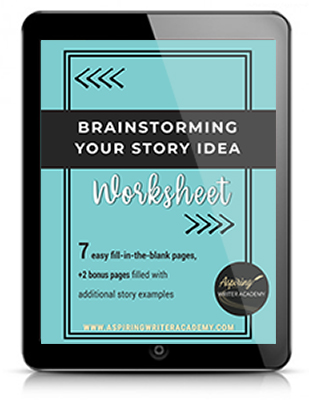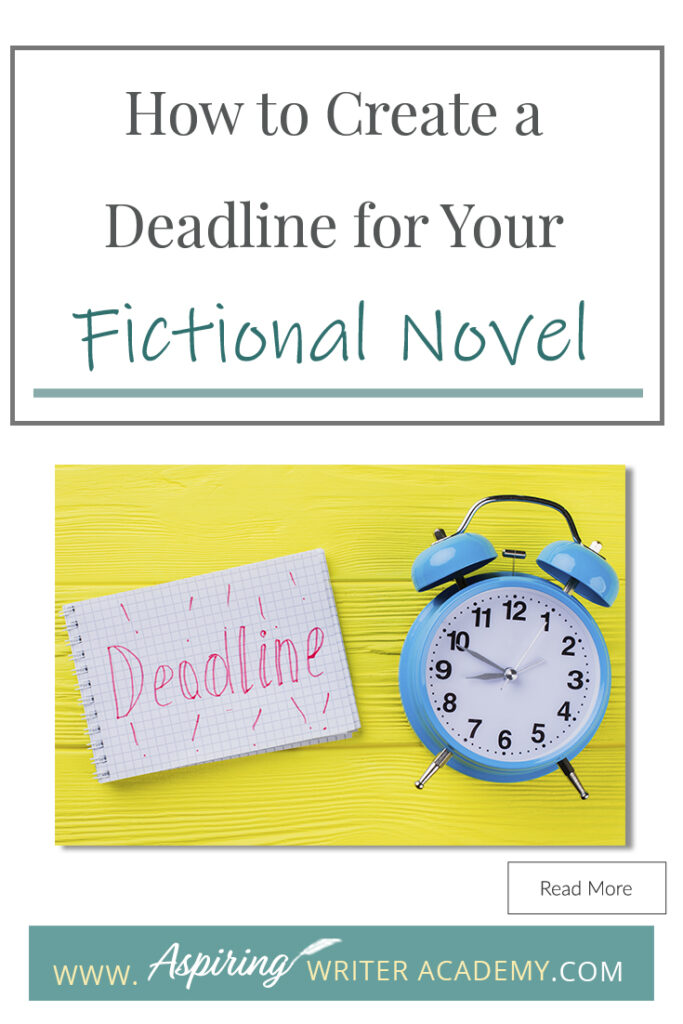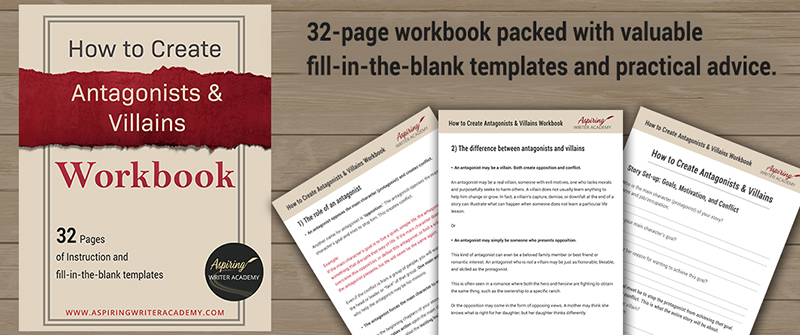How to Create a Deadline for Your Fictional Novel

The difference between a goal and a dream is that a goal has a deadline, a targeted finish date. Is it your goal to write and finish a book? Do you have an action plan? Or does the whole process feel overwhelming? Even if you do not have a book contract you should aim for a date of completion to help keep you on track.
In our post, How to Create a Deadline for Your Fictional Novel, we show you how to calculate your finish date and set up milestones to mark your progress toward a finished book.
In the post below we will discuss:
- Calculating Your Book’s Finish Date
- Dividing the Goal into Milestones
- Creating Monthly/Weekly Task Lists
- Readjusting Missed Deadlines
- Importance of Celebrations & Rewards
Writing a fictional novel is a daunting enough, let alone trying to estimate when you will finally type “The End.” If you work outside the home, care for young children or elderly parents, or just have a crazy life schedule in general, you might think that you cannot possibly know how long it will take you to finish your book.
What do I tell an editor if they should ask?
How do I find more time to write?
What if I get derailed? What if I set a deadline and get so far behind that I can’t possibly catch up?
Won’t having a deadline create even more stress in my life?
Don’t worry, we have a Plan B. If you do not have a book contract, you have a little more wiggle-room to readjust your book deadline. Of course, it is in your best interest to finish the book on time, but if the unexpected happens and your deadline is no longer realistic, you can certainly adjust your milestones and completion date.
The most important thing is to keep the goal in sight.
With a specific plan to write the chapters, scenes, and individual pages of your fictional novel, or reach targeted wordcounts by set dates, your confidence will soar as you reach milestone after milestone. Progress boosts motivation. Achievement leads to satisfaction, uplifts our spirits, and fills our minds with positive thinking. You can do this!
You can write and finish a book!
Ready to get started?
1) Calculating Your Book’s Finish Date
First, considering potential publisher’s submission guidelines, or the norm for your genre, what is the wordcount that you are aiming for? 55,000 words? 80,000 words? 100,000 for a finished novel?
How many words can you realistically write in a week?
If you have never written a book before, you may need to write for a few weeks to get a good grasp of what is realistic for you.
Divide the total wordcount needed for your fictional novel by the number of words you can write each week, and you will have the number of weeks it will take you to finish writing your book.
Example:
A 85,000 word fictional novel divided by 5,000 words written per week will take approximately 17 weeks to finish.
Look at your starting date and count 17 weeks into the future and you have your preliminary finish date.
What is it?
Great! But hold on—we’re not done yet!
Next, take out your calendar and cross off days set aside for vacations, holidays, birthdays, appointments, and other outside commitments. These are the days and times that you will not be able to work on your novel.
Look at the space that is left and pencil in some color-coded blocks (time-slots) for writing your novel. How many blocks can you fit in each week? Is it still realistic that you can keep writing your calculated number of pages week after week?
Are there some weeks where you might have to adjust your targeted wordcount?
If you plan to take a one-week vacation during the months you plan to write your novel, you will have to add a week to the total time it will take you to finish.
If there are two weeks where you are extra busy and can realistically only complete half the needed wordcount, you will have to move your book deadline to another week out.
Have you added in any sick days or buffer time? Allowances for the unexpected? Consider how much time you want to add to the total time it will take you to finish the book. If you finish early, it will make you feel that much better! But if you need an extra couple of days to finish writing the book by your deadline, you will be glad that you had some buffer time built into your calculations.
Putting it all together after adjustments:
- How many weeks will it take you to write and finish your book?
- What is your official book deadline?
Mark that date on the calendar and circle it in red!
2) Dividing the Goal into Milestones
Even after dividing the entire wordcount into weekly goals, the number of weeks needed to complete your manuscript can seem endless.
To avoid feeling overwhelmed, which can lead to depression and burnout, it is advisable to break the writing of the novel into smaller steps and create achievable milestones. These milestones allow you to see how far you’ve come and give you the chance to celebrate little victories or “wins” with your writing along the way.
This keeps up momentum as you write from one milestone or ‘little victory’ to the next. However, there are a couple of different ways that you can do this.
- Create a graph or chart with the number of weeks needed to complete your fictional novel. For each week you achieved the required wordcount, give yourself a smiley sticker or fill in the graph or chart as your wordcount totals rise.
- Or you can set each finished chapter of your novel as a milestone. For each finished chapter you can fill in another notch on a graph or chart or give yourself smiley stickers. Perhaps create a bubble chart: O-O-O-O-O and stick it above your computer or on your refrigerator, someplace where you will see it each day. Having a visual of your progress is very motivating.
- Within a single week, you may set each scene of your chapter as a milestone, especially if you like lots of celebrations and encouragement to see how you are progressing.
To set up milestones for your fictional novel you may need to consider the following:
How many chapters do you expect to write for a fictional novel of that wordcount?
Do you know how much time it takes you to write one chapter?
How many pages or what is the general wordcount of each one of your chapters?
How many words or pages do you usually have for each scene?
Give each milestone a tentative deadline.
If you need to write 20 chapters for an 85,000 word novel in 20 weeks, that is one chapter per week.
If you plan to write an 18-chapter novel in one year, you will need to write one and a half chapters a month.
If you plan to write a 16-chapter novel in 8 months, you will need to write 2 chapters per month.
3) Creating Monthly/Weekly Task Lists
As writers, we know there is a lot more that goes into writing and finishing a fictional novel than just writing pages. You will also have to account for the time it takes to complete other tasks that lead to a finished book.
Example:
- Research.
- Character profile questionnaire.
- Components of a book proposal such as a query letter, back cover blurb, synopsis. Or promotional blurbs intended for sales pages or bookmarks.
- Visits to the location / setting of your novel.
- Phone calls and inquiries to those who can help with story details and development.
Creating a to-do list with everything that should be accomplished for the current month or week can be extremely beneficial. Circle items on your list as each one is completed. You can refer to these items as tasks.
What are your goals for this week? What writing-related tasks do you need to accomplish this week in addition to writing pages?
Which goals / tasks will help you reach your next milestone?
If you set up each finished chapter as a milestone, your weekly to-do’s can include each scene that needs to be written within that chapter.
If you have a milestone goal of writing 2 chapters a month, how many scenes total do you need to write? It depends on how many scenes you include in each chapter.
Or maybe your weekly tasks can include a combination:
- Getting the required number of words written
- Research
- Character Profiles
- Write 4 scenes
Customize the plan so that it works for you. A good plan will keep you accountable and productive. Just remember—do not let the tasks keep you from writing the required wordcount. The writing must come first if you want to finish writing a novel.
4) Readjusting Missed Deadlines
What if you fail to achieve a milestone in a timely manner (which may ultimately cause you to miss the deadline for finishing your book?)
First you must honestly evaluate why you missed getting the number of required pages written. Why did you miss your milestone deadline?
Did too many personal or even writing-related tasks get in the way? Did you control your calendar, or did you let it control you? Was there a true emergency that ate up some of your time? Were you unrealistic about how many pages you could write each week? Or are you just not motivated to put in the time? Did you go out to lunch with friends or watch too much TV this week?
Most weeks, if you miss one day of writing, you can work longer or harder on a different day to make up for the lost time. If something comes up that must be addressed during one of your writing time blocks, maybe you can switch your writing block to another time slot later in the week. This is a good reason to also schedule ‘buffer blocks’ into your weekly calendar.
Even bigger milestones (mini-goals toward finishing your book) such as finishing a chapter can be made up the following week or month if you put in the extra effort or rearrange things to allow yourself to ‘catch up.’
However, if you are halfway through writing your book and find that you are seriously behind or halfway to your designated deadline and are still drafting Chapter One, then you might have to readjust the deadline for finishing your novel. Motivation will fade if you feel overworked and always behind.
Instead, give yourself a Plan B – a fresh start. Take into account what derailed your previous plan and create a new plan that you feel is more realistic.
Consider where you are at with your fictional novel, set a new deadline, and go forward from there. Lesson learned. This may be a little hiccup in the time schedule, but with a new plan, you can regain your excitement for finishing your novel.
5) Importance of Celebrations & Rewards
Motivation is key to finishing your novel by your book deadline. How can you keep the momentum going week after week?
It helps to know your “why.”
Most entrepreneurs will tell you that you have to know your “why.”
- Why do you want to write a book?
- What happens after you finish?
- How bad do you want it?
- Why is writing a book so important to you?
If you want to write a book just because you thought it might be a neat idea, your enthusiasm will probably wane.
But if you want to write a book because you have a deep passion for wanting to share a particular story with the world, or you would like to earn enough money from your writing to quit your horrid 9 to 5 job and spend more time with your children, then you have more at stake riding on the outcome of your finished novel.
You have a strong “why” that will keep you going even when you feel like giving up.
It also helps to give yourself a reward for each milestone met and celebrate your accomplishments.
Make the writing process fun! Right from the start you should write down the reward you will give yourself when you finish writing your fictional novel.
Also list what reward you will give yourself (besides a smiley sticker) for each milestone goal met along the way.
Example: You can give yourself one charm on a bracelet for each milestone achieved. If you set milestones for each chapter, you will get one charm for each completed chapter and at the end of your novel you will have a whole charm bracelet.
Or maybe you can set aside $20. for each milestone you reach. When your book is finished, you will have enough to do something special with the money.
Maybe you will choose to go out to lunch with friends each time you reach a writing milestone or go out to dinner and celebrate your accomplishment with your family. Include loved ones in the rewards and they will happily cheer you on!
Make sure your reward is motivational and not something you would just do anyway. Your reward should be a special treat. Something you would really like, something that will push you forward with your writing.
Our brains like rewards and the incremental joy of receiving a ‘reward’ of some kind for each milestone achievement will motivate you to keep going and finish the book!
We hope you have found How to Create a Deadline for Your Fictional Novel helpful and informative so that you can map out a plan to write and finish your book.
If you have any questions or would like to leave a comment below, we would love to hear from you!
If you like more help developing your story, you may wish to download our Free Brainstorming Your Story Idea Worksheet
We Believe All Authors Can Aspire to Take Their Writing to the Next Level!
Do you find it difficult to create compelling antagonists and villains for your stories? Do your villains feel cartoonish and unbelievable? Do they lack motivation or a specific game plan? Discover the secrets to crafting villains that will stick with your readers long after they finish your story, with our How to Create Antagonists & Villains Workbook.
This 32-page instructional workbook is packed with valuable fill-in-the-blank templates and practical advice to help you create memorable and effective antagonists and villains. Whether you're a seasoned writer or just starting out, this workbook will take your writing to the next level.
Our Goal for Aspiring Writer Academy is to help people learn how to write quality fiction, teach them to publish and promote their work, and to give them the necessary tools to pursue a writing career.

ENTER YOUR EMAIL BELOW
TO GET YOUR FREE
"Brainstorming Your Story Idea Worksheet"
7 easy fill-in-the-blank pages,
+ 2 bonus pages filled with additional story examples.
A valuable tool to develop story plots again and again.
Other Blog Posts You May Like
Top 7 Books to Make You a Super-Productive Writer
How to Boost Your Productivity and Get Your Novel Written
How to Create S.M.A.R.T. Goals to Keep Your Writing on Track
How to Find a Writing Group: Tips for New Authors
Write Your First Novel: How Do You Start?
Do You Dream of Being a Published Author? (How Bad Do You Want It?)
Who is an ‘Aspiring Writer?’ 3 Tips to Escalate Your Career No Matter What Level You Are At
How to Write the Midpoint of Your Novel (and Avoid a ‘Saggy Middle’)
20 Items to Bring to Your First Writer’s Conference
How to Find a Great Story Idea in 4 Easy Steps
How to Write a Novel While Working Full Time
The Pros and Cons of Writing Holiday Fiction (Collections & Anthologies)
Fiction Writing: How to Find a Critique Partner/Group
How to Research Information for a Historical Novel
7 Steps to Begin Writing a New Fictional Story
Fiction Writing: 5 Key Differences Between a Novel and a Novella
Fiction Writing: Office Supplies to Help You Prepare to Write Your Next Novel
3 Levels of Goal Setting for Fiction Writers

is a multi-published author, speaker, and writing coach. She writes sweet contemporary, inspirational, and historical romance and loves teaching aspiring writers how to write quality fiction. Read her inspiring story of how she published her first book and launched a successful writing career.































